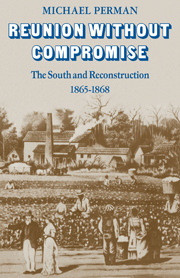Book contents
- Frontmatter
- Contents
- Preface
- Part I Conciliation and conflict
- Part 2 Encouraging Southern loyalty, 1865
- Part 3 Seeking Southern cooperation, 1866
- Part 4 Demanding Southern acquiescence, 1867–1868
- 9 Reconstruction enjoined – March to July 1867
- 10 Reconstruction resisted – July to December 1867
- Epilogue: The irrelevance of the moderates, 1865–1868
- Appendix: Registration and voting statistics for the Southern State Constitutional Conventions, 1867–8
- A note on sources
- Index
9 - Reconstruction enjoined – March to July 1867
Published online by Cambridge University Press: 05 August 2012
- Frontmatter
- Contents
- Preface
- Part I Conciliation and conflict
- Part 2 Encouraging Southern loyalty, 1865
- Part 3 Seeking Southern cooperation, 1866
- Part 4 Demanding Southern acquiescence, 1867–1868
- 9 Reconstruction enjoined – March to July 1867
- 10 Reconstruction resisted – July to December 1867
- Epilogue: The irrelevance of the moderates, 1865–1868
- Appendix: Registration and voting statistics for the Southern State Constitutional Conventions, 1867–8
- A note on sources
- Index
Summary
Submission – Why
With the passage of the Reconstruction Act in February 1867, the North's terms for Southern readmission had become the law of the land. They could not be avoided. A fundamental reassessment of Southern strategy was imperative. ‘Masterly inactivity,’ which had never been entirely masterly nor entirely inactive, had to yield to activity, which, if complete and organized, might yet be masterly, at least insofar as affairs in the South alone were concerned. To activate the Southern will toward compliance with a law of the land, which embodied the North's unpalatable terms for Southern readmission, would require energy and resourcefulness on the part of the leaders of the conquered section. The call to action, for a mobilization of Southern will and energies, did, nonetheless, produce compliance speedily and on a broad scale. From the Charleston Courier came the warning: ‘It is too patent a fact to be disregarded, that inaction can be of no earthly avail.’ And in an editorial for the Augusta Constitutionalist, ‘Junius Brutus’ warned that ‘to take an active part in political affairs becomes an imperative duty. Everything will be lost by tame submission to tyranny.’
This, however, was not an attempt to rouse the South from torpor in order to offer a positive and cooperative accommodation to terms which were deemed to be justified in function or content. In an open letter, hurriedly produced and then published widely in the Georgia press during the last week of February, Joseph E.
- Type
- Chapter
- Information
- Reunion Without CompromiseThe South and Reconstruction: 1865–1868, pp. 269 - 303Publisher: Cambridge University PressPrint publication year: 1973



